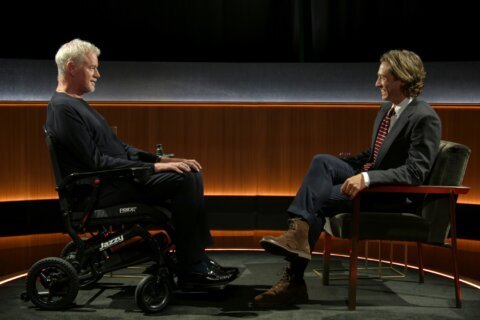WASHINGTON — Can stand-up comedy help military veterans heal after returning from war?
That’s the goal of the nonprofit Armed Services Arts Partnership (ASAP), which presents its latest “Comedy Bootcamp” graduation show at DC Improv this Wednesday at 7:30 p.m.
“That’s the culminating performance of our stand-up comedy class for veterans,” founder Sam Pressler told WTOP. “We do a seven-week class where we train veterans, service members and military family members on stand-up comedy. We like to have a nice celebration at the end where you can perform the jokes you’ve been working on throughout the class on stage in front of supportive members of the community. So we hope folks will come on out.”
Ten ASAP comedians will perform five-minute sets a piece, followed by a panel discussion.
“We go behind the scenes of the experience and not just hear the jokes, but understand what went into the jokes,” Pressler said. “People show up saying, ‘I came here to be supportive,’ and at the end they’re like, ‘Holy crap, that was really funny!’ So you’re going to laugh your a** off and you’re going to be like, ‘Oh my god, I’m also supporting a really good cause.'”
Pressler launched the group at the College of William and Mary in Williamsburg, Virginia.
“It was essentially based off a research project I was doing as a student where I learned a little bit about the mental health challenges in the veteran space, as well as the civilian-military gap where less than 1 percent of the population has served since 9/11. It’s created this disconnect between those who have served and those who haven’t. I was on the other side of that gap.”
While Pressler himself didn’t serve in the military, he related to the subject of mental health.
“I used humor as a means to cope following a suicide in my family,” Pressler said. “On a more basic level, I think we use humor, comedy and laughter as a means to connect with folks when we feel disconnected. We lean into each other when we laugh and it lowers barriers.”
Soon, his humble student organization grew into an actual nonprofit organization in 2015.
“We accept applications year-round,” Pressler said. “What we look for in those applications is people’s interests. Why do you want to be in this class and what do you want to accomplish? We invest a lot in the program and we want to make sure people are equally committed.”
U.S. Marine Michael Garvey applied after serving in Iraq in 2008 and Afghanistan in 2011.

“I dropped out of high school when I was 17, like most good marines,” Garvey joked. “I ended up a combat engineer with all of the IEDs. … Like an old man on a beach looking for change is basically the whole job, except they’re land mines.”
While serving in Afghanistan, Garvey was shot twice, once in the abdomen and once in the thigh.
“I started to resent being alive a little bit, so I tried to figure out something I could do,” Garvey said. “When I saw Sam’s class for the first Comedy Bootcamp in D.C., I was like, ‘This is perfect.'”
Garvey has since gone from a student to an instructor running the seven-week class.
“In the beginning, there’s a lot of: What is comedy? What is a joke? What is a punchline?” Garvey said. “After the first week, we tell them to go home and come up with two minutes of material … When they come back, they perform in front of the class, then we’ll critique it, try to give them jokes, where they need to take stuff out, where they can add stuff [and] we get them to five minutes.”
When Garvey takes the stage, he’s often joined by his dog, Liberty.
“People think I’m blind,” Garvey said. “They just assume the dog went to war: ‘Were you guys together in Iraq? How long have you been fighting together?’ I’m like, ‘That’s not a thing man.’ … I address it right away [on stage] and tell people I was shot twice in Afghanistan and if that happens, occasionally they’ll just give you a really sweet dog instead of proper medical care.'”
In this way, Garvey began spinning ignorant civilian questions into stand-up material.
“People on the street give you material on a regular basis,” Garvey said. “They just want to walk up to you and ask you the most ridiculous questions and start assuming all this stuff about you. It would make me angry and I couldn’t live like that, so I started making fun of them. Not to their face, but I’d come home and write it down and then I’d bring it on stage.”
The line between comedy and tragedy was most apparent at ASAP’s recent show at the Atlas Performing Arts Center on H Street Northeast. The first half of the show featured laugh-out-loud stand-up acts, while the second half featured dramatic readings of horrific war stories.
“That was an intense show,” Garvey said. “That was a good one to go to, because you got to see the comedy and then the storytelling. … I just want to laugh, I don’t want to cry! When it was over, I went out and hugged those guys and then just left. I was like, ‘That was intense.'”
Along the way, ASAP prides itself in its diverse representation.
“When people go see the show, they’ll realize it’s not just your stereotypical military humor,” Pressler said. “The veteran experience really represents the totality of the human experience, so you’re going to see people talk about being a parent, you’re going to see a real broad array of experiences and stories. That’s a really important part of that dialogue, that it’s not just a white-male veteran telling XYZ story … but a range of people. That’s what’s really cool.”
Find show details on the DC Improv website. Listen to our full conversation below:








